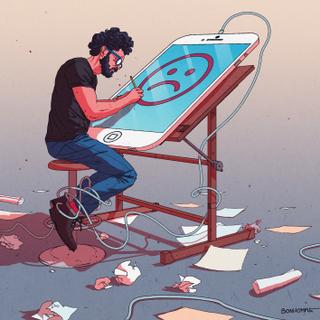


Press caricatures: 'A certain fear weighs on both cartoonists and newspaper editors'
InterviewWhile press cartoons are in decline, they have also – especially since the January 7, 2015 attack on the magazine Charlie Hebdo – been the subject of hostile reactions and controversies, particularly online, explain historians Christian Delporte and Bruno Nassim Aboudrar in a joint interview.
Ten years after the January 7, 2015 attack on the magazine Charlie Hebdo, and almost five years after the murder of teacher Samuel Paty, on October 16, 2020, press cartoons, and in particular caricatures – the specific satirical visual genre which derides its targets by depicting them in grotesque ways – have ended up in a paradoxical situation. Indeed, press cartoons have likely never attracted so much attention: from public authorities, the media and citizens alike, all of whom have made them a symbol of freedom of expression and free criticism of all powers. And yet, the number of press cartoonists around the world is steadily declining, as is the space their work is given in the media.
Admittedly, this situation is largely due to the hostility of authoritarian regimes, which readily use tools of censorship and repression against all artists and journalists who are critical of the authorities. Yet the same downward trend can also be observed in Western democracies, in which news cartoons continue to provoke hostile reactions, particularly online.
In 2019, The New York Times announced – following the controversy sparked by a cartoon depicting Benjamin Netanyahu as a dog, held on a leash by Donald Trump – that it would no longer publish satirical cartoons in its international edition (its national edition had already given up on them years earlier), shaking the profession, which saw it as a concrete sign of the medium's loss of prestige.
In France, a similar trend seems to be occurring: The space given to press cartoons continues to decline in the major daily newspapers. Even Charlie Hebdo, despite its status as a victim of terrorism, has not been spared, as evidenced by the rapid decline in its sales and subscriptions after the strong mobilization of support in 2015; or, recently, the indignant reactions sparked by its coverage of the Pelicot rape trial; as well as the debate over whether the future House of Press Cartoons should display the cartoons of the Prophet Muhammad which had led to the magazine being targeted by jihadists.
You have 89.4% of this article left to read. The rest is for subscribers only.
